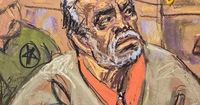In a historic moment for the decades-long war on drugs, Ismael "El Mayo" Zambada, the elusive mastermind behind Mexico’s Sinaloa cartel, stood before a Brooklyn federal court on August 25, 2025, and pleaded guilty to U.S. drug trafficking charges. The 75-year-old cartel kingpin, whose name has long been synonymous with the violent rise of the Sinaloa cartel, admitted to a sweeping list of crimes that spanned continents and generations, and issued a rare apology for the devastation his empire wrought on both sides of the border.
“I recognize the great harm illegal drugs have done to the people in the United States and Mexico,” Zambada said through a Spanish-language interpreter, according to the Associated Press. “I apologize for all of it, and I take responsibility for my actions.” It was a striking moment of contrition from a man whose criminal career began in the late 1960s and helped shape the global narcotics trade.
Zambada’s guilty plea marks the end of an era for the Sinaloa cartel, which prosecutors say evolved from a regional upstart into the world’s largest drug trafficking organization under his leadership alongside Joaquín “El Chapo” Guzmán. The U.S. Department of Justice detailed how the cartel, under Zambada’s direction, built sophisticated networks with Colombian cocaine producers, oversaw vast shipments by boat and plane, and smuggled staggering quantities of drugs across the U.S.-Mexico border. Zambada admitted that, from 1980 until his arrest in 2024, he and his organization were responsible for transporting at least 1.5 million kilograms of cocaine—most of which ended up in the United States. Prosecutors also charged him with trafficking heroin, fentanyl, and methamphetamine.
The court heard how Zambada’s influence extended far beyond logistics. He acknowledged that people working for him paid bribes to Mexican police and military commanders “so they could operate freely,” a practice that, as he recounted, dated back to the earliest days of the cartel. “Culpable,” he declared in court, the Spanish word for “guilty.”
Zambada’s criminal enterprise was not just about drugs; it was about violence, power, and fear. Prosecutors described him as a strategist and dealmaker—less flamboyant than El Chapo, but more deeply involved in the cartel’s day-to-day operations. He admitted to directing people under his control to kill others to serve the cartel’s interests, including ordering the murder of his own nephew. “Many innocent people were also killed,” Zambada told the court in an eight-minute address, as reported by the Associated Press.
The Sinaloa cartel’s reign was marked by a private security force armed with powerful weapons and a cadre of “sicarios,” or hitmen, who carried out assassinations, kidnappings, and torture. The violence spilled over into Mexican society, with deadly fighting erupting in Sinaloa following Zambada’s arrest, pitting his loyalists against the so-called “Chapitos”—the sons of El Chapo, who now run a rival cartel faction. According to AP, the bloodshed in the Sinaloan capital of Culiacan has left bodies in the streets, businesses shuttered, and schools closed during sudden bursts of conflict.
Zambada’s path to the top of the cartel began with humble and desperate beginnings. After leaving school with only a sixth-grade education, he planted marijuana for the first time in 1969. From there, he moved into selling heroin and, eventually, became a key figure in the international cocaine trade. His rise was emblematic of how poverty and lack of opportunity in rural Mexico have fueled the drug trade for generations.
Despite being sought by U.S. law enforcement for more than two decades, Zambada managed to evade arrest in both Mexico and the United States. His luck ran out in 2024, when he was apprehended in Texas after arriving on a private plane with Joaquín Guzmán López, one of El Chapo’s sons. Zambada has claimed he was kidnapped in Mexico and brought to the U.S. against his will, a detail that adds another layer of intrigue to his dramatic downfall.
His arrest and subsequent guilty plea came after federal prosecutors announced they would not seek the death penalty, a decision that Zambada’s attorney, Frank Perez, called “an important step in resolving the case.” Perez told reporters outside the courthouse, “The outcome was good. He wanted to accept responsibility, and he did.” The plea agreement does not require Zambada to cooperate with U.S. investigators, and Perez emphasized that his client never truly wanted to go to trial; once the death penalty was off the table, his “focus shifted to accepting responsibility and moving forward.”
Zambada pleaded guilty to charges of engaging in a continuing criminal enterprise between 1989 and 2024 and racketeering conspiracy covering crimes from 2000 to 2012. The charges encompass a staggering range of offenses, from drug trafficking to orchestrating violence and corruption on a grand scale. He faces life in prison and billions of dollars in financial penalties, with sentencing scheduled for January 13, 2026.
The Sinaloa cartel’s influence has reached the highest levels of Mexican government, with a former cabinet member convicted of taking bribes to protect the organization. According to prosecutors, the cartel’s militarized structure and deep corruption allowed it to operate with near impunity for decades. The U.S. fight against the cartel intensified in recent years, with authorities declaring such groups terrorist organizations and pressuring the Mexican government to extradite high-ranking cartel figures.
Zambada’s guilty plea comes six years after El Chapo was sentenced to life in prison in the same Brooklyn courtroom. The fall of these two titans marks a seismic shift in the landscape of organized crime, but the violence and instability left in their wake remain. In Sinaloa, the power struggle between Zambada’s loyalists and the Chapitos continues to claim lives and disrupt daily life.
For many, the question now is whether Zambada’s conviction will make a dent in the global drug trade he helped build—or whether new leaders will simply step in to fill the void. As Zambada himself urged from behind bars, he called on people in Sinaloa to avoid further violence. Whether his words will have any impact remains to be seen, but for the families torn apart by addiction and cartel bloodshed, the scars left by the Sinaloa cartel are unlikely to heal soon.
With Zambada’s era at an end, the world watches to see what comes next for Mexico’s oldest and most notorious criminal organization.







